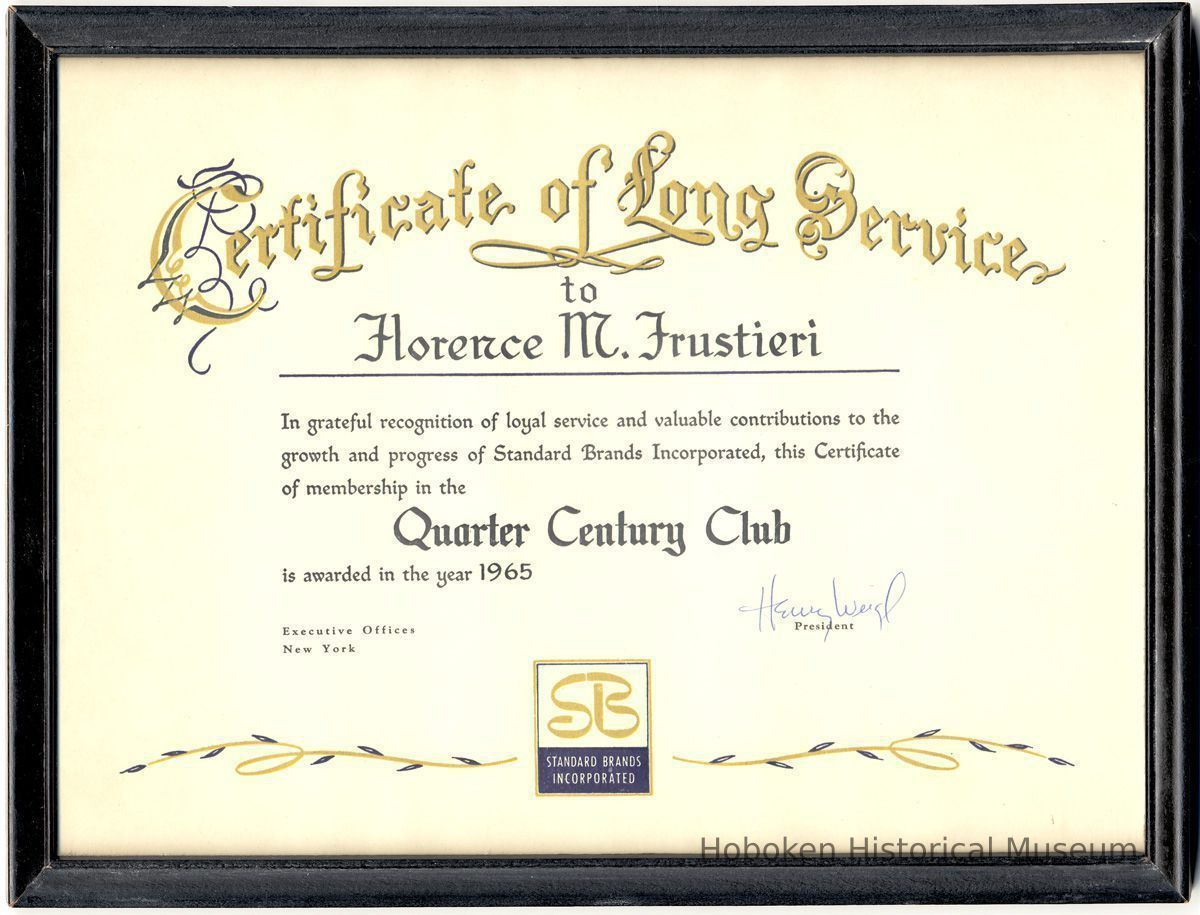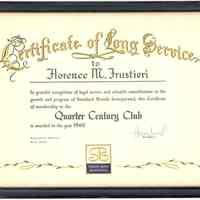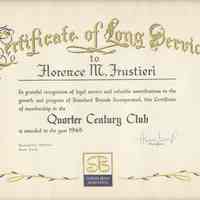Collections Item Detail
Certificate of Long Service to Florence M. Frustieri; 25 years Standard Brands, Inc., Hoboken, 1965.
2011.044.0012
2011.044
Frustieri, Florence
Gift
Gift of Florence Frustieri.
n/a
1965 - 1965
Date(s) Created: 1965 Date(s): 1965
Notes: This is Google's cache of http://hoboken.patch.com/articles/time-with-the-lady-of-tea; as it appeared on Aug 10, 2011 18:22:15 GMT. [n.b. statements below on factory dates, building developers, etc. should be verified from other sources rather than used as written here.] Text-only version The Neighborhood Files Time With The Lady of Tea A 90-year-old resident speaks about her career at Standard Brands. By Amanda Staab May 17, 2011 "My sweat and blood is in that place over there," said Frustieri, a sophisticated and energetic woman in her nineties, referring to the 12-story concrete building on the north end of Washington Street. The building was constructed in the early 1900s under the direction of the Hoboken Land and Improvement Company, owned by the Stevens family, and used to store ammunition during World War I. Standard Brands bought it in the 1930s, painted it green, and made it a factory. The factory was sold and renovated in the 1990s, and Toll Brothers, the developer, has plans for three new residential buildings, making the now-three-block Hudson Tea complex into a sprawling six-block campus, which is unheard of even in a city known for development. Construction on the next installment, 1450 Washington St., which will have 13 stories on the side nearest the old factory, is currently underway. Frustieri was 19 and fresh out of high school when she applied to work at Standard Brands in 1940. She was looking for administrative work, but the company didn’t have any openings in its top-floor office. Instead, Frustieri was offered a position in the tea department, and she took it. "I met so many nice people at the factory," she said, and so she never looked any further. At the time, Hoboken was more known for its industry than residential space. Big name manufacturers like General Foods, Maxwell House, Bethlehem Steel, and the ITT Continental Baking Company, with its famous Hostess Cupcake and Wonder Bread, were scattered throughout town. It wasn’t hard to find work in Hoboken, but it wasn’t easy to get a job at Standard Brands. Jobseekers needed to have an in, know someone who worked there or have a stellar letter of recommendation. Frustieri had gotten hers from someone whose godmother was a department supervisor. Standard Brands had a variety of foodstuffs that were available on store shelves nationwide, but in Hoboken, the company produced its Royal Pudding, Chase and Sanborn Coffee, and Tender Leaf Tea. That’s right. Standard Brands made its own tea in the same building as Lipton. And since the Standard Brands competitor had stamped the roof with a giant logo, few people ever realized that Lipton only rented a portion of the building. Frustieri said, "Everybody would ask, 'You work for Lipton Tea?'" And she was proud to tell them that no, she worked for Standard Brands. Most of her colleagues were also Hoboken residents. Some of them were next-door neighbors, married, or related in some way. "We got along very well as far as I can remember," said Frustieri. Standard Brands employees usually walked to work—the factory had no parking lot—and changed into uniforms when they got there. Frustieri wore a red and white smock while she worked, whether she was on the day or nighttime shift. At the factory, there were three shifts, the first from 7 a.m. to 3:30 p.m., the second from 3:30 p.m. to midnight, and the third from midnight to the morning. Standard Brands employees worked around the clock. "We even worked on Sunday," Frustieri said. No one got to choose which department they worked in, but Frustieri had gotten her preference, the tea department. Pudding, she said, was too slow and too dusty with all the ingredient sifting through the air, and coffee, too smelly. Standard Brands, like nearby Maxwell House, brought in raw coffee beans by the barge and roasted them onsite. The aroma carried for blocks and stayed in employees’ hair. It never bothered Frustieri while she was at the factory. “It was just when I went home and everybody said,'Somebody must be making coffee,'" she said. Work was divided among the sexes. Women, who outnumbered men three to one, performed tedious jobs, while their male counterparts did the heavy lifting. In the tea department, Frustieri sat opposite another woman who was also picking up tea bags from a conveyor belt and packing them into the red and white Tender Leaf Tea boxes. Men would then pack the boxes into bigger boxes, load them onto a skid and send them down to shipping. Men were also mechanics and maintenance workers. Both sexes served as supervisors, and at one point, Frustieri was promoted to forelady of tea, but that didn’t last long. "They didn’t like the way I did the job," she said. Frustieri explained that her boss once asked her if she had noticed something going on in the department that he’d witnessed, but Frustieri hadn’t seen anything suspicious. "I used to close my eyes to a lot of things that were going on," she said. Besides, she added, she didn’t like being in charge. Two years after Frustieri started at Standard Brands, World War II broke out. Men left to fight, while women continued to report to the factories. Frustieri said one afternoon, a female colleague rushed into the department yelling about the war being over, but no one would listen to her. "She had a few cocktails on her lunch hour," said Frustieri, "and that’s why we didn’t believe her. It was so funny. ‘I’m telling you, the war is over.’ ‘Yeah, okay.’” Someone with a radio finally confirmed what the woman was saying was true, and the celebration began. “We threw everything out the window,” said Frustieri. She and the other women in the tea department tossed rolls of tea bag envelopes that went streaming toward the Hudson River. “We went crazy,” said Frustieri. “We were all happy that it was over.” They all went home early that day. Frustieri said she doesn’t remember how much she made, but said it was a great job. The company treated its employees well and very few of them ever quit. Every year, there was a Christmas party held in Columbus Park, and after Frustieri had worked there for 25 years, she was invited to join the company’s Quarter Century Club. Standard Brands threw a big party for her and her colleagues at Manhattan’s Hotel Astor and gave each one of them a gold watch and a certificate, which Frustieri still keeps in a frame. “I don’t even have my high school diploma in a frame,” she said. Factories started shutting down all over Hudson County in the 1960s. Hoboken’s Keuffel and Esser, known for its slide rules and other drafting supplies, was one of the first to go. Lipton Tea moved to Englewood, and Mighty Fine and Tootsie Roll left for Chicago. Other manufacturers went south or wherever labor and land were cheaper. Standard Brands managed to hold on until 1977 but closed its Hoboken location soon after the company merged with Nabisco. Some of the men who’d worked there found new jobs at Maxwell House and Hills Brothers, a coffee plant in Edgewater. Frustieri, like many of the women, retired. “You have no industry here anymore,” said Frustieri. “That’s the worst part.” The loss of so many factories and jobs, she said, was not nearly as surprising as the influx of new residents in the decades that followed. While other factories were turned into coffee shops, convenience stores, and gyms, Standard Brands was sold and divided into condos. “I don’t know where people work now,” said Frustieri. But with the ongoing construction at the north end of Washington Street, it is clear where many of them will soon live, though the Hudson Tea development will only ever remind Frustieri of her time at Standard Brands. City Historian Lenny Luizzi helped by contributing background information for this story. Status: OK Status By: dw Status Date: 2011-08-14



